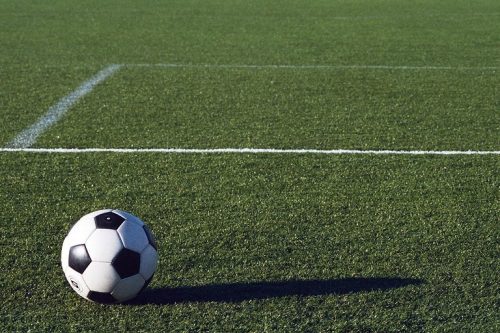James Drake explains why we need to take concussion more seriously in football

As the number of footballer dementia cases snowballs, the link between heading the ball and post-career dementia is becoming undeniable. Though ongoing research is yet to confirm exactly how heading the ball can cause dementia, the correlation is there – and many of England’s most notable footballers are now paying the price.
Following a series of campaigns and research findings from major organisations like the Drake Foundation, football authorities such as the Professional Footballers’ Association (PFA) and the Football Association (FA) are now starting to take more notice of the unmistakable connections between heading the ball and neurodegenerative decline – and are proposing much-needed changes. But we’re only in the early stages of tackling sports-related concussions, and there’s still much work to do.
Here, sports-science philanthropist and founder of the Drake Foundation James Drake explains why we need to take football concussions more seriously and how the Drake Foundation’s early research, amongst other studies and campaigns, has already pushed football associations to take the first steps towards protecting players.
Football Dementia Cases
Former footballers have been diagnosed with dementia for decades, but these diagnoses have only come to the forefront of media attention over recent years. In particular, the media has recently spotlighted multiple players from the 1966 World Cup-winning team who now have dementia, driving nationwide concern about the link between football-related concussions and neurodegenerative decline.
Amongst these players, Nobby Stiles is the latest high-profile footballer to pass away following a battle with dementia. Stiles passed away on 30th October, age 78. It’s unlikely to be a coincidence that his teammates Ray Wilson, Martin Peters, and Jack Charlton all also suffered from dementia before they passed away. Not to mention the fact that Jack Charlton’s brother and fellow professional footballer – Sir Bobby Charlton – has now also been diagnosed.
Many other footballers deserve a mention, too. Jeff Astle, Peter Bonetti, Tommy Carroll, Stevie Chalmers, Chris Chilton, Jimmy Conway, Duncan Forbes, Alan Jarvis, Frank Kopel, Billy McNeill, Barry Pierce, Mike Sutton, John Talbut, Kevin Moore, and Mike Tindall are just some of the other footballers who spent their retirements struggling with the disease.
It’s clear that we need quick changes in football practices to curb concussion-related dementia. Thanks to in-depth research from organisations like the Drake Foundation, the industry is finally beginning to see some of these changes coming into place.
Sports-related Concussion Studies
One of the most advanced studies into the connection between heading the ball and dementia is the Drake Foundation’s HEADING (Health and Ageing Data in the Game of Football) Study, which investigates the connection between repeatedly heading the ball and neurodegenerative disease. The PFA is working with the Drake Foundation to source players for this study. Meanwhile, the FA is supporting the FIELD Study, which has already revealed that footballers are 3.5 times more likely to die from a neurodegenerative disease than the general population.
While the FIELD Study examines medical records from players who have passed away, the HEADING Study is working with retired footballers to uncover associations between a history of heading the ball or concussion and neurodegenerative disease. Up to 300 former footballers aged 50+ are participating by undergoing physical and cognitive tests, neurological clinical examinations, blood tests, and face-to-face assessments to monitor their ongoing grip strength, memory, and reasoning.
Meanwhile, neuroscientist Dr Michael Grey is running the SCORES Study, which complements the HEADING Study by monitoring players’ brain health in a series of three-monthly tests. Dr Grey is managing the study in collaboration with the University of East Anglia and is currently recruiting 34 former footballers age 40+, including Iwan Roberts and Mark Bright; 50 amateur footballers; and a control group of 34.
But gaining support from the football authorities hasn’t been easy for Dr Grey, who asked the PFA and FA to endorse the study and encourage sign-ups over a year ago. It wasn’t until the media highlighted the lack of support from football authorities and suggested a seven-point charter in November that the PFA offered to support the study. Meanwhile, the FA has defended its efforts by referencing concussion studies that it has already supported in the following statement.
“The FA has helped to lead the way in ground-breaking research, and we have an unwavering commitment to support objective, robust, and thorough research. We recognise the importance of this issue. We are collaborating closely with our independently chaired research taskforce to expand our own research studies – most notably using the findings of the FIELD Study to understand what causes the observed increased risk of death from neurodegenerative disorders in the analysed group of former professional footballers, which is currently unknown. In addition, we are also supporting ongoing independent research studies which are looking into the impact of head injuries in football.”
University of Birmingham Saliva Tests
On top of these studies, the University of Birmingham has now found that saliva contains testable biomarkers that reveal whether a person has sustained a concussion. The university has used its findings to develop a handheld device that could, in future, instantly diagnose concussions. Premier League footballers are now partaking in a study that tests saliva and urine samples to identify concussions. The university hopes that the resulting device could be ready for pitch-side use in 2022.
“I am delighted by the prospect of a handheld device that might more quickly diagnose concussions by testing saliva, and it could be available in the coming years,” says James. “It is vital that the links between football and dementia are researched further so that footballers can be protected from suffering long-term cognitive diseases.”
The PFA’s and FA’s Proposed Changes
As of November 2020, the PFA and FA have proposed changes to improve safety in football practice for upcoming generations. These proposed changes follow the latest in research from the Drake Foundation, as well as media accusations from various parties, who argue that the football authorities haven’t done enough to protect players. For starters, Nobby Stiles’ family is campaigning for changes to football protocols, claiming that older players with dementia have “largely been forgotten”.
As a result, the PFA now proposes to reduce heading in footballers’ training and introduce concussion substitutions during matches. These substitutions will allow temporary replacements while concussed players undergo full assessments. The University of Birmingham’s saliva-test device could make these assessments easier to implement. Meanwhile, the FA plans to fund further research into the link between sports-related concussions and dementia and update its guidance to discourage children under 12 from heading the ball. Various players have announced their support for these initial proposals.
“We had a management committee meeting with current players, and they were fully behind [the plans],” says the PFA’s chief executive Simon Barker. “[They] wanted us to come out and try and lobby the governing bodies and the leagues in respect of taking this up. It’s normally in training that most of the heading actually goes on, rather than games. It’s very important that we keep lobbying for this. In some other countries it’s not seen as a major problem so it’s important that we actually show them what the issues are. From January, we’re hoping that there might be a trial period.”
As the Drake Foundation continues to develop the research and knowledge share that we need to encourage safe practice in football and reduce concussions, you can keep up to date with the HEADING Study at www.drakefoundation.org/the-heading-study.
About the Drake Foundation
The Drake Foundation is a not-for-profit organisation that funds sports science research and brings key medical players together to collaboratively overcome the sports-concussion challenge. The Foundation currently has a series of ground-breaking research projects underway: while the HEADING Study is rapidly redefining the football industry’s understanding of concussion risks, the Drake Foundation is also the driving force behind the Drake Football Study, the Evaluating Concussion in Premier League Football Study, and the BRAIN Study, amongst others.
James Drake launched the Drake Foundation in 2014 to shape a healthy future for football and rugby players. Over the last six years, the Drake Foundation has invested more than £2 million into research dedicated to sports players’ welfare. James is also the founder and chairman of the Future Science Group – which publishes the latest in industry-defining medical and biotechnological research – and the founder of the Drake Calleja Trust, which enables upcoming musicians from underprivileged backgrounds to realise their career potential.









